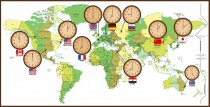Category Archives: Nicholas Negroponte
Robot Poetry: Representation & Technological Poetics
W.J.T. Mitchell, in his gloss of the notion of “representation,” addresses Aristotle’s Poetics, commenting particularly on Aristotle’s criteria for distinguishing representations from one another — but he changes Aristotle’s language slightly. Where Aristotle speaks of the object, the manner, and the
Robot Poetry: Representation & Technological Poetics
W.J.T. Mitchell, in his gloss of the notion of “representation,” addresses Aristotle’s Poetics, commenting particularly on Aristotle’s criteria for distinguishing representations from one another — but he changes Aristotle’s language slightly. Where Aristotle speaks of the object, the manner, and the
The Limitations (?) of Geography
Though Derek Walcott’s essay is the only one to explicitly (deeply, intimately, affectively) confront the “Caribbean” — Stuart Hall addresses it in passing several times as part of his larger critical-theoretical overview, and Nicholas Negroponte takes as his subject the
The Limitations (?) of Geography
Though Derek Walcott’s essay is the only one to explicitly (deeply, intimately, affectively) confront the “Caribbean” — Stuart Hall addresses it in passing several times as part of his larger critical-theoretical overview, and Nicholas Negroponte takes as his subject the

What’s so Wrong With “An Age of Optimism” in “societies structured in dominance” Anyway?
Written 20 years ago at the nascent start of what would become the digital era, readings from Nicholas Negroponte’s Being Digital (Chapter 13 and Epilogue) strike me as simultaneously prescient for its understanding of the ways technology would change

What’s so Wrong With “An Age of Optimism” in “societies structured in dominance” Anyway?
Written 20 years ago at the nascent start of what would become the digital era, readings from Nicholas Negroponte’s Being Digital (Chapter 13 and Epilogue) strike me as simultaneously prescient for its understanding of the ways technology would change
Shipwreck of Fragments: Reading roundup
In his essay “The Post-Information Age,” Negrponte suggests that traditional (and historical) modes of capitalist production and consumption are no longer feasible (or profitable) in the digital age. Breaking what he calls “space and time,” the post-information age is indicated
Shipwreck of Fragments: Reading roundup
In his essay “The Post-Information Age,” Negrponte suggests that traditional (and historical) modes of capitalist production and consumption are no longer feasible (or profitable) in the digital age. Breaking what he calls “space and time,” the post-information age is indicated
Transcending Time and Place/Space
In the (generally) optimistic messages of both both Derek Walcott’s speech and Negroponte’s article, I honestly started out looking for parallels in the works. I noted major ideas and tried to track them through both pieces, hoping to come to
Transcending Time and Place/Space
In the (generally) optimistic messages of both both Derek Walcott’s speech and Negroponte’s article, I honestly started out looking for parallels in the works. I noted major ideas and tried to track them through both pieces, hoping to come to
Reflections and Connections
Much like my colleague, Jamal George, establishes in his post “Time Zones”, time, specifically the idea of the future and how the past defines the present is very important in defining Digital life in the Caribbean and world as we
Reflections and Connections
Much like my colleague, Jamal George, establishes in his post “Time Zones”, time, specifically the idea of the future and how the past defines the present is very important in defining Digital life in the Caribbean and world as we

Time Zones
What criteria is a first world country defined by? The list of developed nation characteristics may range from a generally high average income per capita of the population to a majority of the population living in cities and receiving relatively

Time Zones
What criteria is a first world country defined by? The list of developed nation characteristics may range from a generally high average income per capita of the population to a majority of the population living in cities and receiving relatively

